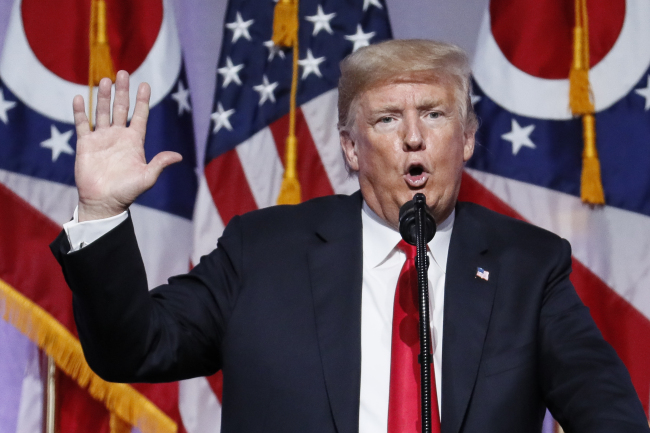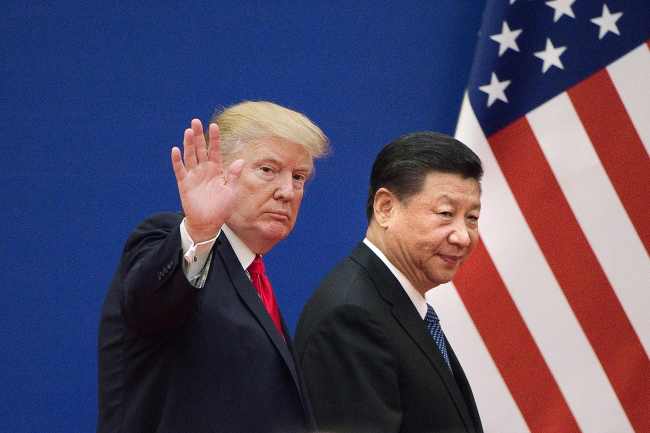US President Donald Trump on Wednesday reaffirmed his decision to suspend joint military exercises with South Korea, but also warned he could “instantly” resume the drills, and they could be “far bigger than ever before,” both appeasing and pressuring North Korea amid the stalled denuclearization talks.
 |
(Yonhap) |
Without directly taking aim at North Korean leader Kim Jong-un, Trump blamed China -- North Korea’s biggest ally, currently engaged in an intensifying trade dispute with the US -- for a lack of progress on North Korea’s denuclearization.
Trump’s simultaneous gesture of goodwill and implicit military threat could be a tactic to appease and pressure North Korea into taking bolder steps to denuclearize, such as releasing an inventory of the North’s nuclear weapons, according to analysts.
“There is no reason at this time to be spending large amounts of money on joint US-South Korea war games,” Trump said in a White House statement that he tweeted, citing his “very good” and “warm” relationship with North Korean leader Kim.
“Besides, the president can instantly start the joint exercises again with South Korea, and Japan, if he so chooses. If he does, they will be far bigger than ever before,” the statement read.
Trump has suspended the drills, which North Korea has denounced as “rehearsals for invasion,” while talks with North Korea are underway in “good faith,” following his June 12 summit with Kim in Singapore.
Trump’s statement appears to be dialing back remarks made by Defense Secretary James Mattis on Tuesday, when he said that the Pentagon has no plans to suspend any more exercises.
One of the exercises that could be resumed is the combined Vigilant Ace air drill, scheduled for December. Seoul’s Defense Ministry said no decision has been made over whether to conduct the drill.
 |
(Yonhap) |
As the possible resumption of South Korea-US military exercises fueled worries over the direction of the US’ North Korea policy, Mattis appeared to backtrack Wednesday, saying in a statement “no decisions” had been made on the matter.
“The Department of Defense suspended three individual military exercises in order to provide space for our diplomats to negotiate the verifiable, irreversible and complete denuclearization of the Korean peninsula,” Mattis said in a statement. “Our military posture has not changed since the conclusion of the Singapore summit and no decisions have been made about suspending any future exercises.”
Several US officials acknowledged Wednesday that planning is going forward for the spring exercises, which require months of preparation, according to a news report.
“Routine planning continues for major US-ROK exercises on the peninsula in accordance with the normal exercise program planning cycle,” the Associated Press quoted the spokesman for the US Joint Chiefs of Staff as saying.
A stalemate in North Korea-US denuclearization talks was highlighted after Trump canceled Pompeo’s planned trip to Pyongyang, citing “insufficient” progress on denuclearization talks. US media reported that Pompeo received a “belligerent” letter from a North Korean senior official.
Follow-up negotiations to the US-North Korea June Singapore summit have shown little progress, with the two countries divided over the sequence of the denuclearization process.
Trump pointed the finger at China for the slow progress on North Korea’s denuclearization.
“China makes it much more difficult in terms of our relationship with North Korea,” Trump said at the White House, though he insisted his ties with Chinese President Xi Jinping were “great.”
The US and China have been engaged in a trade dispute for months, with each side slapping tit-for-tat tariffs on imports from the other country. Some experts say that both China and the US may be using North Korea to gain leverage in their bilateral negotiations.
“We know that China is providing North Korea with considerable aid, including money, fuel, fertilizer and various other commodities. This is not helpful!” Trump said in the tweeted statement.
Beijing’s cooperation is considered crucial in pushing the US’ pressure campaign on North Korea, as China is Pyongyang’s key source of hard currency, food and fuel. About 90 percent of North Korea‘s foreign trade is estimated to go through China.
By Ock Hyun-ju (
laeticia.ock@heraldcorp.com)










![[Exclusive] Hyundai Mobis eyes closer ties with BYD](http://res.heraldm.com/phpwas/restmb_idxmake.php?idx=644&simg=/content/image/2024/11/25/20241125050044_0.jpg)
![[Herald Review] 'Gangnam B-Side' combines social realism with masterful suspense, performance](http://res.heraldm.com/phpwas/restmb_idxmake.php?idx=644&simg=/content/image/2024/11/25/20241125050072_0.jpg)

